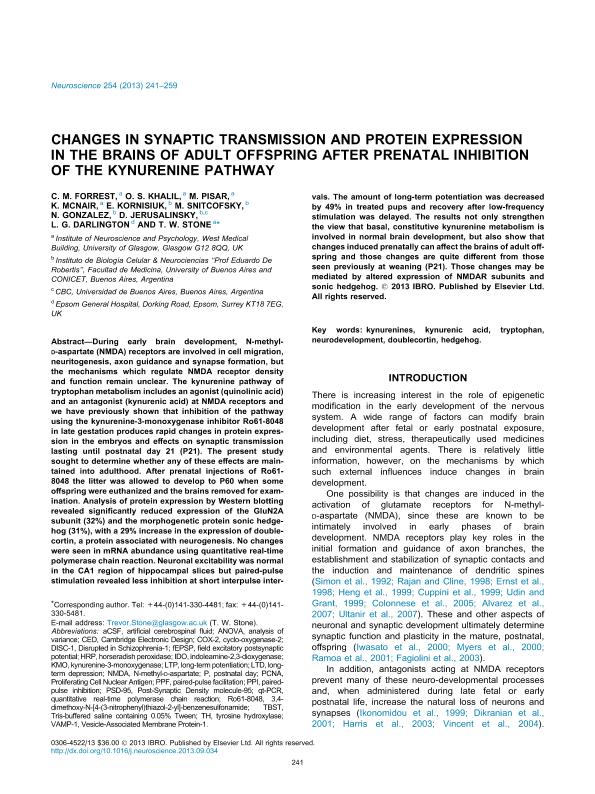Artículo
Changes in synaptic transmission and protein expression in the brains of adult offspring after prenatal inhibition of the kynurenine pathway
Forrest, C. M.; Khalil, O. S.; Pisar, M.; Mcnair, K.; Kornisiuk, Edgar Ernesto ; Snitcofsky, Marina
; Snitcofsky, Marina ; Gonzalez, Nelida Noemi
; Gonzalez, Nelida Noemi ; Jerusalinsky, Diana Alicia
; Jerusalinsky, Diana Alicia ; Darlington, L. G.; Stone, T. W.
; Darlington, L. G.; Stone, T. W.
 ; Snitcofsky, Marina
; Snitcofsky, Marina ; Gonzalez, Nelida Noemi
; Gonzalez, Nelida Noemi ; Jerusalinsky, Diana Alicia
; Jerusalinsky, Diana Alicia ; Darlington, L. G.; Stone, T. W.
; Darlington, L. G.; Stone, T. W.
Fecha de publicación:
10/2013
Editorial:
Elsevier
Revista:
Neuroscience
ISSN:
0306-4522
Idioma:
Inglés
Tipo de recurso:
Artículo publicado
Clasificación temática:
Resumen
During early brain development, N-methyl-D-aspartate (NMDA) receptors are involved in cell migration, neuritogenesis, axon guidance and synapse formation, but the mechanisms which regulate NMDA receptor density and function remain unclear. The kynurenine pathway of tryptophan metabolism includes an agonist (quinolinic acid) and an antagonist (kynurenic acid) at NMDA receptors and we have previously shown that inhibition of the pathway using the kynurenine-3-monoxygenase inhibitor Ro61-8048 in late gestation produces rapid changes in protein expression in the embryos and effects on synaptic transmission lasting until postnatal day 21 (P21). The present study sought to determine whether any of these effects are maintained into adulthood. After prenatal injections of Ro61-8048 the litter was allowed to develop to P60 when some offspring were euthanized and the brains removed for examination. Analysis of protein expression by Western blotting revealed significantly reduced expression of the GluN2A subunit (32%) and the morphogenetic protein sonic hedgehog (31%), with a 29% increase in the expression of doublecortin, a protein associated with neurogenesis. No changes were seen in mRNA abundance using quantitative real-time polymerase chain reaction. Neuronal excitability was normal in the CA1 region of hippocampal slices but paired-pulse stimulation revealed less inhibition at short interpulse intervals. The amount of long-term potentiation was decreased by 49% in treated pups and recovery after low-frequency stimulation was delayed. The results not only strengthen the view that basal, constitutive kynurenine metabolism is involved in normal brain development, but also show that changes induced prenatally can affect the brains of adult offspring and those changes are quite different from those seen previously at weaning (P21). Those changes may be mediated by altered expression of NMDAR subunits and sonic hedgehog.
Palabras clave:
Kynurenines
,
Neurodevelopment
,
Doublecortin
,
Hedgehog
,
D-Aspartate
,
Tryptophan
Archivos asociados
Licencia
Identificadores
Colecciones
Articulos(IBCN)
Articulos de INST.DE BIOLO.CEL.Y NEURCS."PROF.E.DE ROBERTIS"
Articulos de INST.DE BIOLO.CEL.Y NEURCS."PROF.E.DE ROBERTIS"
Citación
Forrest, C. M.; Khalil, O. S.; Pisar, M.; Mcnair, K.; Kornisiuk, Edgar Ernesto; et al.; Changes in synaptic transmission and protein expression in the brains of adult offspring after prenatal inhibition of the kynurenine pathway; Elsevier; Neuroscience; 254; 10-2013; 241-259
Compartir
Altmétricas



